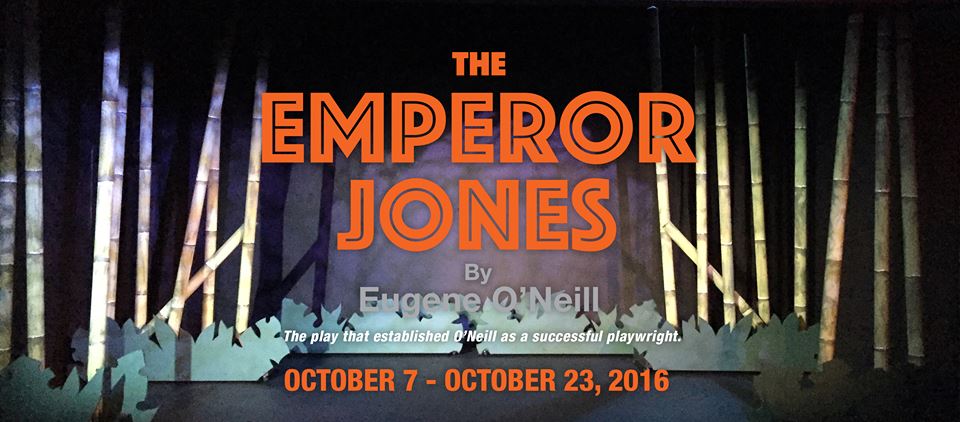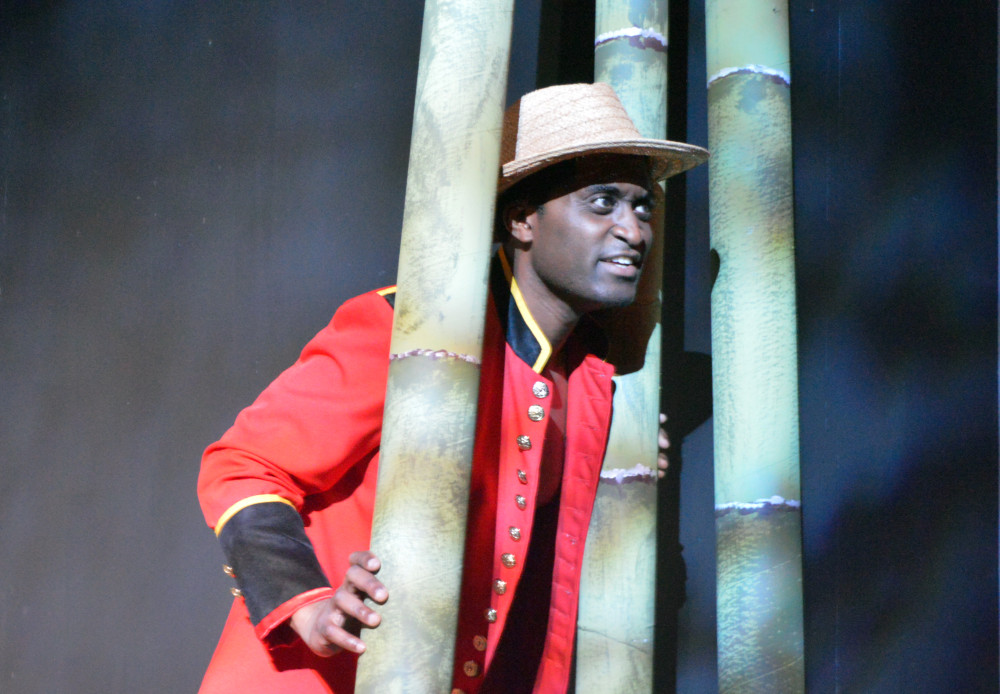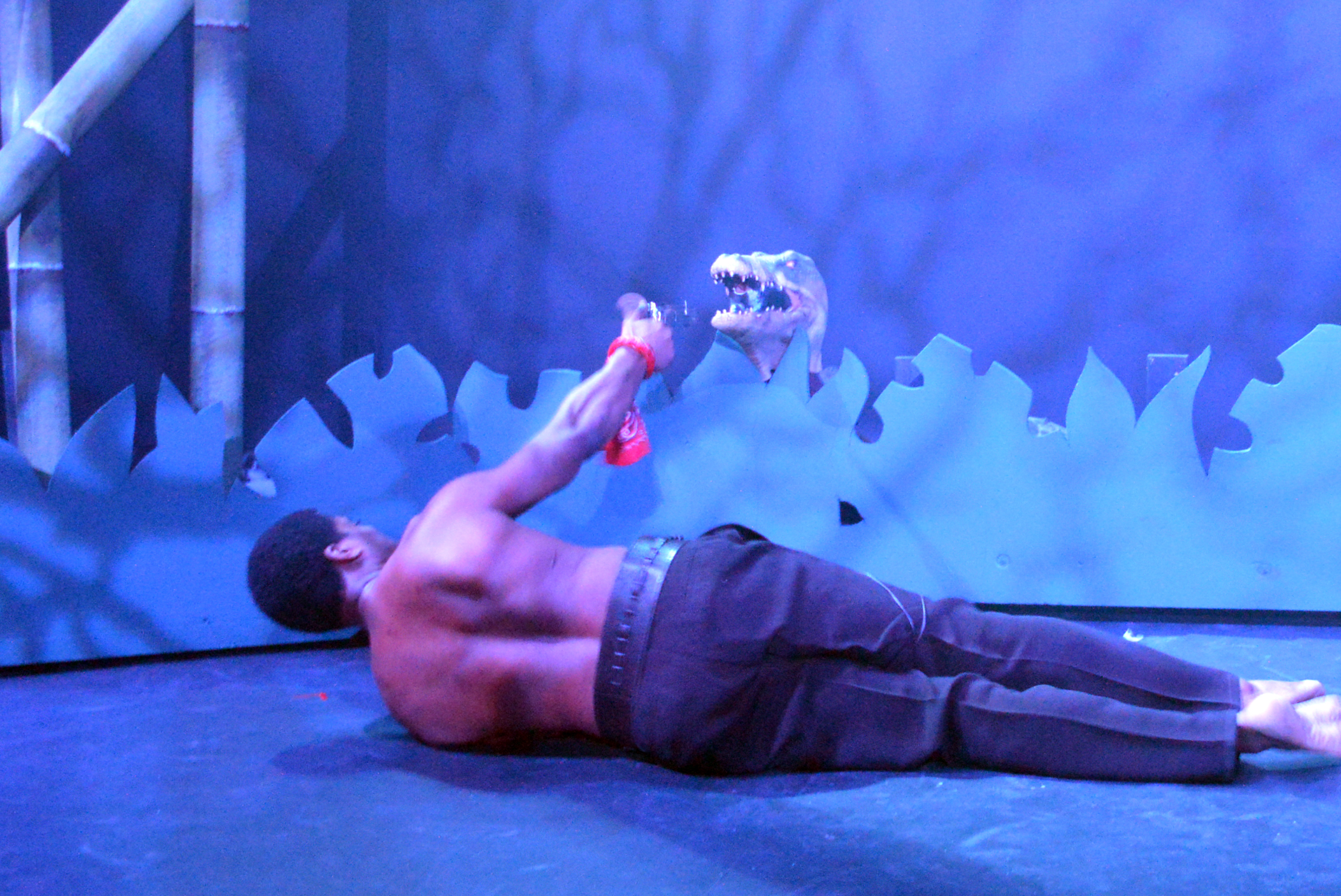Almost 100 years ago, Eugene O’Neill wrote THE EMPEROR JONES, one of the most unusual tragedies in American theater history. An African American with internalized racism directed against people of color, central character Brutus Jones is a former chain gang prisoner, gambler, and Pullman Car porter who kills another black man in a dice game. He is jailed but escapes to a small, backward Caribbean island where he sets himself up as emperor—oppressing and exploiting the indigenous population.
Naturalism was the preferred mode in the theater world until German expressionism revolutionized dramatic writing, including the work of O’Neill. His EMPEROR JONES presents a synthesis of expressionism and realism and adds the use of unreliable narrators and multiple points of view.
This drama has seen some great actors since its first performance in 1920, including a film adaptation in 1933 that featured Paul Robeson (1898–1976), as the Emperor Jones. When Robeson was blacklisted during the McCarthy era, revivals of THE EMPEROR JONES sprung up in many theaters at the time, in defiance of his persecution and suppression.
O’Neill’s play kicks off the South Camden Theatre Company‘s Fall season. We presented nine questions to the director, Connie Norwood, and the cast: Maurice A. Tucker (Emperor Jones), Paul Sollimo (Smithers), Carla Ezell and Isaiah Harold (in various roles), and Trevor Smith (dancer). [South Camden Theatre Company, 400 Jasper Street, Camden, NJ] October 7-23, 2016; southcamdentheatre.org.
Henrik Eger: How would you describe this tragedy to people who have never seen it before?
Connie Norwood: This play is about imperialism. It is about a man who lied and manipulated his way to the top, began to believe his own lies, and suffered the consequences of his actions.
Maurice A. Tucker: THE EMPEROR JONES is more or less a study of imperialism and the underbelly of the rebel behavior of the native inhabitants.
Paul Sollimo: Shakespeare in the West Indies with a theme of man’s hubris as his downfall and a charlatan’s willingness to take advantage of the seemingly oppressed masses who hold all the cards in the end.
Carla Ezell: THE EMPEROR JONES is a play that takes a hard look at human nature, the struggle of socio-economic separation in an indigenous caste society and the basic conflict between moral rightness and wrongness in a “survival of the fittest” mentality. Regarding the attitudes and stereotypes toward people of color, it is very much a product of its time—early 20th century.
Eger: Share a quote from the play that speaks to you, and talk about its significance.
Norwood: “If dey’s one thing I learns in ten years on de Pullman ca’s listenin’ to de white quality talk.”
What rings with me is the fact that many people of color work in jobs where they hear the complaints or the praise of people, “how wonderful the lives are of the people in power.” It makes people of color wonder, “if only that was my life” and dream of it happening to them. In this play, Jones attempts to use what he learned “listenin’ to de white quality talk”—but is unprepared for the consequences.
Tucker: “Talk polite, white man! Talk polite! I’m boss heah now, is you fergettin’!”
This quote speaks to me because at that time and even today, it takes a great deal of courage [for a man of color] to speak in such a way to the image of “the white man.”
Sollimo: “You died in the heidth of style anyhow.”
It’s an interesting quote—putting value on how someone died, as if that holds any value for the deceased.

Eger: What is your role and what do you bring to it, both as a professional and as a human being?
Tucker: I play Brutus Jones, the self-proclaimed Emperor. I like to believe I bring a precision to it with its vernacular and slick-talking nature of being a former worker—a porter on the Pullman trains—who would never achieve such liberation until becoming a rebel in his own right.
Sollimo: I play Henry Smithers, a white trader and con man. What do I bring to this role, apart from a cockney accent learned from years of watching Monty Python?:
A sensitivity to the dynamics of human relationships and psychology: motives, power, fear. And the need for contrast between the characters to help define the tension and shift of power in the narrative of the story.
It would be easy to portray Smithers as a one-dimensional racist of his time period. However, portraying Smithers as having admiration and even affection for Jones opened up possibilities for more levels and nuance which allows Smithers to be more human and relatable rather than a stereotype.
Ezell: I play various parts throughout the show. As a “ha’nt” (ghost), I believe I bring a reality check of sorts as the mental stability of Brutus Jones unravels. The reenacted memories of his past are destroying his fortitude, bringing him to a place of surrender and reckless abandon. Watching someone lose their mind every night is great fun as an actor. It affords me the opportunity to play the oppressor by my mere presence.
Eger: THE EMPEROR JONES shows a self-assured, ruthless character who has managed to run a whole country on a Caribbean Island, setting himself up as the emperor. How relevant is such a setting for the US in our own time?
Tucker: Imperialism will persist as long as those in power can exercise their beliefs on the indigenous. That is usually done because those in power have the technology to do so.
Sollimo: “Emperor” Jones’s power is gained through bluff and bravado. That accurately reflects the current state of politics in the US. All flash and no substance, motivated by self-promotion and gain. Today’s career politicians are very much their own version of Emperors.
Ezell: I feel this setting, both in time and place, reflects the US currently because we still occupy territories that are not actually part of our country, for example Puerto Rico, the Virgin Islands, and Guam.
Eger: O’Neill based part of his play on the US occupation of Haiti, after deadly rebellions on that impoverished island, showing imperialism in its crudest form. Do you see any remnants of this form of oppression in our own time?
Norwood: Yes, in the continued use of English as the international language. Though a majority of the world’s population is not made up of native English speakers, millions are forced to learn it to maintain a living in their own country.
In this play, Jones chastises Smithers for not taking the time to learn the language of the people of the island. Smithers trades with the natives and is able to become very wealthy but he assumes the natives will learn English to trade with him, instead of him adapting and learning the native language. It always seems that when a country overtakes another, the conquered have to change their identity as a people to survive and prosper under the new rulers.
Tucker: “Imperialism in its crudest form” is all over the world, even today. Take any part of Africa; Ireland; Iraq, Syria, and the Middle East; Australia; etc.
Sollimo: Having Jones be of African descent was an interesting choice for O’Neill to make. Brutus Jones, a racist, exploits the indigenous population that he considers below himself.
His ruthlessness and contempt for others speaks to the root of imperialism, often based more on disparities of culture and resources than on differences of race. That’s an important concept to consider when so much oppression is assumed to be based on race alone.
Ezell: We have effectively taken over those territories [such as Puerto Rico, the Virgin Islands, and Guam] because it profited us to do so, ignoring the ways of life and traditions of indigenous peoples in those locations. We have forced them to accept us as their reigning government. This play from 1920 accurately parallels our own time.

Eger: What was the biggest challenge for you in making this problematic tragedy come alive—without losing the audience?
Norwood: Considering the limited theatre space, the challenge was maximizing the space and giving the feel of being in a forest and sending the audience on the journey with Jones. Years ago, after viewing the movie with Paul Robeson, I noticed that instead of using a realistic set, the set was painted scrims [strong, coarse fabric] and the forest looked surreal.
Years later, reading the script again, the first thing that struck me was the sound of the persistent drum and how important that was to give pulse, life, and urgency of the piece. The nature of THE EMPEROR JONES is similar to a Shakespeare play. However, it was important to have the audience bypass the word “nigger” and have them realize that, when the play was written, this term did not have the connotations with which we associate it today.
Tucker: As Emperor Jones, the biggest challenge is and was managing the pace of his decline as he fails to navigate through the bush that he proclaimed to know high and low like a book. But as you see it visually, from losing his hat, coat, and then his shoes, you realize he has completely gotten himself in way over his head—even in knowing his demise would occur soon.
Sollimo: Scene one is long and lays out all the exposition. It’s a challenge to keep the scene moving with only two characters—Emperor Jones and Smithers, the white trader who seems to be involved in some illegal actions—without the performance dragging and possibly losing the interest of the audience. The expressionistic parts in the woods (scenes 2-7) seem to lend themselves to more variation and interesting visuals.
Ezell: The challenge we all face is to advocate for our characters and make them human and relatable to audiences who may not personally identify with the struggle of a conquered people. It is our job to create an emotional connection between the audience and our characters. We also want our viewers to mentally dissect the motives, actions, and outcomes of each of our characters in the story as it unfolds.
Our job is to help the audience understand and accept the roles we each play. My character only has five lines to run a wide range of emotions to display the humility, brokenness, frustration, and anger of an enslaved people that forces them to rebel against their oppressor—an oppressor they initially championed as a savior.
Eger: Were there any moments—from your first table reading, through the rehearsals, all the way to your performance—where you felt connected with these great actors who came before you?
Tucker: Paul Robeson [“who had won an academic scholarship to Rutgers College and was the class valedictorian”] was highly educated—a true Renaissance man. His background and awareness made him a free man. He expressed his views and exercised his beliefs, even though it would cost him.
Sollimo: I intentionally do not watch prior performances if I can help it. That way, I can find my own voice through the playwright’s words and the choices made by the director and my fellow actors.
Eger: Is there anything else you would like to share?
Tucker: I hope that you enjoy our production! I stand in line with anyone that seeks the truth, because it is so revealing and can root out injustice—yet, it is sobering at the same time. I would love to discuss this play more with anyone who comes to see the show.
[South Camden Theatre Company, 400 Jasper Street, Camden, NJ] October 7-23, 2016; southcamdentheatre.org.
1 hour and 40 minutes without an intermission. Friday and Saturday nights at 8:00 PM and Sunday matinées at 2:00 PM.

Let’s quote the review “The production at South Camden Theatre Company, directed by Connie Norwood, lacks any interpretation. The sets (plywood bushes and burlap rocks), the costumes (black leotards and band jackets) and lighting (adequate), all lack specific direction… Maurice A. Tucker’s performance displayed little charisma and appetite that would make it believable that he could mold himself into a strongman king.” But wait there is more – see for yourself! http://dcmetrotheaterarts.com/2016/10/10/review-emperor-jones-south-camden-theatre-co/
A good review but its only one person’s opinion but I heard the wonderful comments from the audience members as they left and it told a different story. Go see the show and decide for yourself.